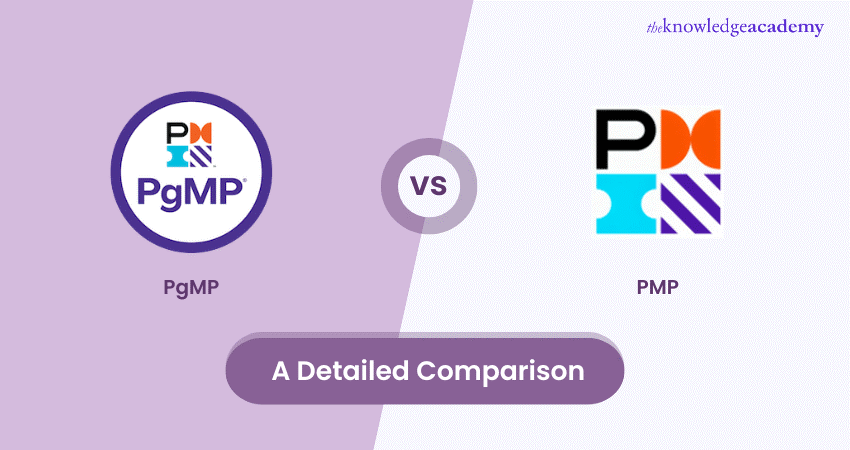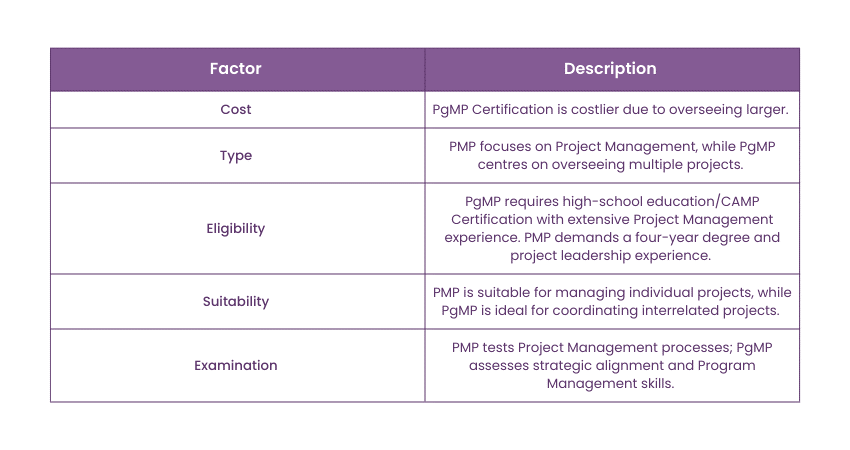We may not have the course you’re looking for. If you enquire or give us a call on 01344203999 and speak to our training experts, we may still be able to help with your training requirements.
We ensure quality, budget-alignment, and timely delivery by our expert instructors.

You might have heard about two renowned certifications, Project Management Professional (PMP) and Program Management Professional (PgMP). However, understanding the nuances and differences of PgMP vs PMP Certifications can help professionals to excel in certain roles. By examining these certifications, you can gain insights into the unique strengths and applications of PgMP and PMP certifications.
If you are willing to pursue them, this blog can help you navigate the complexities of PgMP vs PMP Certifications. You can dive into this blog to unravel the intricacies of these esteemed certifications and empower you to chart a path towards success in the dynamic field of project and program management.
Table of Contents
1) What is PMP?
2) What is PgMP?
3) Differences between PMP and PgMP
a) Cost
b) Type
c) Eligibility
d) Suitability
e) Examination
4) Conclusion
What is PMP?
The Project Management Professional (PMP) Certification is known as a prestigious credential that validates proficiency in Project Management methodologies. It signifies proficiency in leading and directing project teams, ensuring adherence to project constraints and delivering successful outcomes.
By obtaining the PMP Certification, professionals can effectively initiate, plan, execute, monitor, and close projects in accordance with best practices.This certification is highly sought-after by professionals to successfully complete projects within established timelines, budgets and quality standards.
What is PgMP?
The Program Management Professional (PgMP) Certification is designed for professionals seeking to advance program management principles, strategies and practices. PgMP-certified professionals possess the expertise to coordinate multiple related projects within a broader program framework.
By meeting the PGMP requirements and earning the PgMP certification, individuals demonstrate their ability to strategically plan and govern program activities. This credential is highly regarded in industries like Information Technology (IT), healthcare, and construction, where complex program initiatives are prevalent.
Take your career to the next level with our Program Management Professional (PgMP)® Course - book your spot now!
Differences between PMP and PgMP
You must know that both the PMP and PgMP Certifications require renewal every three years through Continuing Certification Requirements (CCR) activities. Moreover, to maintain their certification status, PMP and PgMP holders must earn a specified number of professional development units (PDUs). Let’s now talk about certain aspects that differentiate these two Certifications:

1) Cost
When considering the cost aspect, both the PMP and PgMP Certifications require a financial investment. However, the PgMP Certification entails higher costs compared to the PMP certification due to several factors. This is mostly because PgMP Certification involves overseeing multiple projects aligned with organisational objectives.
Moreover, PgMP candidates typically manage larger-scale initiatives. Essentially, they deal with greater complexity compared to individual projects managed by PMP-certified professionals.
Unlock your path to success: Join our CAPM® Training today!
2) Type
The primary difference between PMP and PgMP Certifications lies in their respective focuses. PMP Certification primarily targets project management, emphasising the skills and knowledge necessary to manage individual projects effectively. On the other hand, PgMP Certification centres around overseeing multiple interrelated projects to achieve broader objectives.
3) Eligibility
Eligibility criteria for the PMP and PgMP Certifications are based on the experience-level and required education. To qualify for the PgMP exam, candidates must hold a high-school certificate, a PMP Certification or 48-month Project Management experience. Along with this, they must have at least 84-month Project Management experience within the last 15 years.
Conversely, PMP candidates must hold a minimum of four years of degree and 36 months of project leadership experience. They should also earn a CAPM Certification/35-hour Project Management training.
4) Suitability
The suitability of PgMP vs PMP Certification depends on the role and responsibilities of the individual within their organisation. PMP Certification is well-suited for Project Managers who can oversee and deliver specific outcomes within the constraints of individual projects. On the contrary, PgMP Certification is ideal for Program Managers who handle interrelated projects that contribute to achieving strategic objectives.
5) Examination
The main difference between PMP and PgMP Certification exams is their focus and content. The PMP exam primarily assesses candidates' knowledge of project management processes and techniques. In contrast, the PgMP exam evaluates candidates' proficiency in strategic alignment, benefits management and program life cycle management.
Ace your PgMP exam with the Program Management Professional Exam Study Guide!
Conclusion
In summary, while both PMP and PgMP Certifications validate management expertise, they cater to different levels of roles. Comprehending what is PgMp vs PMP can help you to understand which certification aligns with your career goals. Acquiring either of these certifications can greatly boost your career potential and unveil fresh avenues of opportunity.
Embrace the future of Project Management with our PMI-ACP Training – register today!
Frequently Asked Questions
Is PgMP more difficult than PMP?

The difficulty level of PgMP vs PMP largely depends on individual experience and proficiency in program versus project management. Mostly, PgMP requires a deeper understanding of program management principles. Hence, the less experienced program management individuals may find it more challenging.
Is PgMP worth getting?

Obtaining PgMP Certification is highly beneficial in program management roles or in advancing program management careers. It validates advanced skills in Program Management and can enhance career prospects, earning potential, and credibility in the field.
What are the other resources and offers provided by The Knowledge Academy?

The Knowledge Academy takes global learning to new heights, offering over 3,000 online courses across 490+ locations in 190+ countries. This expansive reach ensures accessibility and convenience for learners worldwide.
Alongside our diverse Online Course Catalogue, encompassing 19 major categories, we go the extra mile by providing a plethora of free educational Online Resources like News updates, Blogs, videos, webinars, and interview questions. Tailoring learning experiences further, professionals can maximise value with customisable Course Bundles of TKA.
What is the Knowledge Pass, and how does it work?

The Knowledge Academy’s Knowledge Pass, a prepaid voucher, adds another layer of flexibility, allowing course bookings over a 12-month period. Join us on a journey where education knows no bounds.
What are related courses and blogs provided by The Knowledge Academy?

The Knowledge Academy offers various PMP Training, including the PMP Certification Training, CAPM Certification Training, and PMI-ACP Training. These courses cater to different skill levels, providing comprehensive insights into PMP Advantages and Disadvantages.
Our Project Management Blogs cover a range of topics related to PMP and PgMP, offering valuable resources, Best Practices, and industry insights. Whether you are a beginner or looking to advance your Project Management skills, The Knowledge Academy's diverse courses and informative blogs have got you covered.
Upcoming Project Management Resources Batches & Dates
Date
 PMP® Certification Training Course
PMP® Certification Training Course
Sat 5th Apr 2025, Sun 6th Apr 2025
Mon 7th Apr 2025
Mon 14th Apr 2025
Sat 19th Apr 2025, Sun 20th Apr 2025
Tue 22nd Apr 2025
Mon 28th Apr 2025
Sat 3rd May 2025, Sun 4th May 2025
Tue 6th May 2025
Mon 12th May 2025
Sat 17th May 2025, Sun 18th May 2025
Mon 19th May 2025
Tue 27th May 2025
Mon 2nd Jun 2025
Sat 7th Jun 2025, Sun 8th Jun 2025
Mon 9th Jun 2025
Mon 16th Jun 2025
Sat 21st Jun 2025, Sun 22nd Jun 2025
Mon 23rd Jun 2025
Mon 30th Jun 2025
Sat 5th Jul 2025, Sun 6th Jul 2025
Mon 7th Jul 2025
Mon 14th Jul 2025
Sat 19th Jul 2025, Sun 20th Jul 2025
Mon 21st Jul 2025
Mon 28th Jul 2025
Sat 2nd Aug 2025, Sun 3rd Aug 2025
Mon 4th Aug 2025
Mon 11th Aug 2025
Sat 16th Aug 2025, Sun 17th Aug 2025
Mon 18th Aug 2025
Tue 26th Aug 2025
Mon 1st Sep 2025
Sat 6th Sep 2025, Sun 7th Sep 2025
Mon 8th Sep 2025
Mon 15th Sep 2025
Sat 20th Sep 2025, Sun 21st Sep 2025
Mon 22nd Sep 2025
Mon 29th Sep 2025
Sat 4th Oct 2025, Sun 5th Oct 2025
Mon 6th Oct 2025
Mon 13th Oct 2025
Sat 18th Oct 2025, Sun 19th Oct 2025
Mon 20th Oct 2025
Mon 27th Oct 2025
Mon 3rd Nov 2025
Sat 8th Nov 2025, Sun 9th Nov 2025
Mon 10th Nov 2025
Mon 17th Nov 2025
Sat 22nd Nov 2025, Sun 23rd Nov 2025
Mon 24th Nov 2025
Mon 1st Dec 2025
Sat 6th Dec 2025, Sun 7th Dec 2025
Mon 8th Dec 2025
Mon 15th Dec 2025
Sat 20th Dec 2025, Sun 21st Dec 2025






 Top Rated Course
Top Rated Course



 If you wish to make any changes to your course, please
If you wish to make any changes to your course, please


